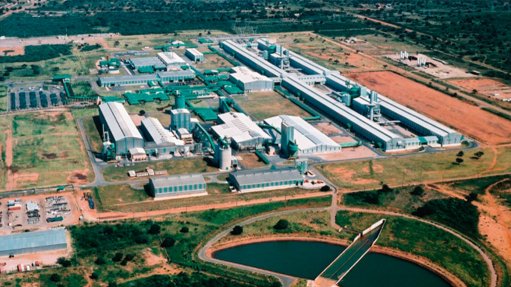Private sector assistance in public sector issues requires clear, concise objectives – BLSA
Business Leadership South Africa (BLSA) CEO Busi Mavuso says clear and concise requests by the public sector or government go a long way in helping the private sector to plan and implement initiatives to address business and societal problems, while vague and open-ended requests do little to alleviate problems.
“I spend a lot of time in engagements with other social partners about how business can best work with government and others. I have learned there are effective ways of getting positive outcomes but there are also ineffective ways that disappoint everyone,” she says.
An example of how the public sector positively requested help from the private sector is Eskom CEO André de Ruyter’s request for assistance in late July to help the utility add generation capacity or otherwise improve generation of electricity in South Africa.
“What made it easy for us to do, is that [De Ruyter] set out clear and specific ways [to address the situation, such as] companies [being able to] lease land they own to independent power producers [IPPs] and sign power purchase agreements with producers so that they can take their projects to banks and other funders to raise finance,” says Mavuso.
Following this, she says, the private sector business community convened a meeting to discuss how to take forward the requests. “We are engaging with the agriculture business chambers to look at suitable land that can be made available to IPPs.”
Further, Mavuso says, broadcasting company Multichoice has agreed, in principle, to support an energy saving marketing campaign to the public.
“We are working with several business partners to work out how we can support safety and security of Eskom’s infrastructure. These will lead to practical and positive outcomes,” she adds.
The second example of how the private sector aims to assist the public sector involves supporting the criminal justice system. “The rule of law is essential to business – it ensures counterparts can be trusted and it enables us to be part of the global business community,” says Mavuso.
“We are very conscious of the exceptional damage done to the criminal justice system by State capture.
“We have long worked to fight crime through our subsidiary Business Against Crime, and now we are working with the National Prosecuting Authority [NPA] to ensure it can access the skills it needs from the private sector to support prosecutions, from forensic accountants to advocates,” she says.
In this regard, BLSA has signed a memorandum of understanding (MoU) to ensure any support is appropriate and protects the NPA’s independence.
This partnership with the NPA also has clear and specific ways in which the private sector can help, aligning with the private sector’s overall objectives, says Mavuso.
The MoU signed by the BLSA and the NPA enables organised business to mobilise skills from the private sector to assist with complex cases.
However, in contrast, public sector requests which the private sector can do nothing about, are those which are generally vague and open-ended asks of business. “For example, we are often told that business should invest more or employ more people. Such requests, on their own, are not helpful,” she explains.
“The conditions under which business will invest or hire more people are no mystery.
“There must be a change in the opportunities for business in the economy, opportunities that make it feasible to expand without taking undue risks. This is why we often talk about structural reforms, which are changes to the way the economy works to improve its effectiveness and shift the risk/return outlook for business,” says Mavuso.
A good example of this, is the change to the Electricity Regulation Act, which enables businesses to generate electricity without a licence. This has triggered billions of rands of investment, she states.
“This change is working because it shifts the outlook for business and enables it to put capital at risk to build and expand.
“But requests in which there is no change to the outlook on offer, merely the request to expand, are meaningless,” explains Mavuso.
The private sector would be able to do more together if these fundamental principles were more widely understood, she says.
“I am more than happy to engage with government to point out problems that constrain companies and prevent them from investing and expanding.
“Together, we can work on solutions that will result in more investment and employment. But investment and employment cannot be a starting point, it must be an outcome,” says Mavuso.
Article Enquiry
Email Article
Save Article
Feedback
To advertise email advertising@creamermedia.co.za or click here
Announcements
What's On
Subscribe to improve your user experience...
Option 1 (equivalent of R125 a month):
Receive a weekly copy of Creamer Media's Engineering News & Mining Weekly magazine
(print copy for those in South Africa and e-magazine for those outside of South Africa)
Receive daily email newsletters
Access to full search results
Access archive of magazine back copies
Access to Projects in Progress
Access to ONE Research Report of your choice in PDF format
Option 2 (equivalent of R375 a month):
All benefits from Option 1
PLUS
Access to Creamer Media's Research Channel Africa for ALL Research Reports, in PDF format, on various industrial and mining sectors
including Electricity; Water; Energy Transition; Hydrogen; Roads, Rail and Ports; Coal; Gold; Platinum; Battery Metals; etc.
Already a subscriber?
Forgotten your password?
Receive weekly copy of Creamer Media's Engineering News & Mining Weekly magazine (print copy for those in South Africa and e-magazine for those outside of South Africa)
➕
Recieve daily email newsletters
➕
Access to full search results
➕
Access archive of magazine back copies
➕
Access to Projects in Progress
➕
Access to ONE Research Report of your choice in PDF format
RESEARCH CHANNEL AFRICA
R4500 (equivalent of R375 a month)
SUBSCRIBEAll benefits from Option 1
➕
Access to Creamer Media's Research Channel Africa for ALL Research Reports on various industrial and mining sectors, in PDF format, including on:
Electricity
➕
Water
➕
Energy Transition
➕
Hydrogen
➕
Roads, Rail and Ports
➕
Coal
➕
Gold
➕
Platinum
➕
Battery Metals
➕
etc.
Receive all benefits from Option 1 or Option 2 delivered to numerous people at your company
➕
Multiple User names and Passwords for simultaneous log-ins
➕
Intranet integration access to all in your organisation


















